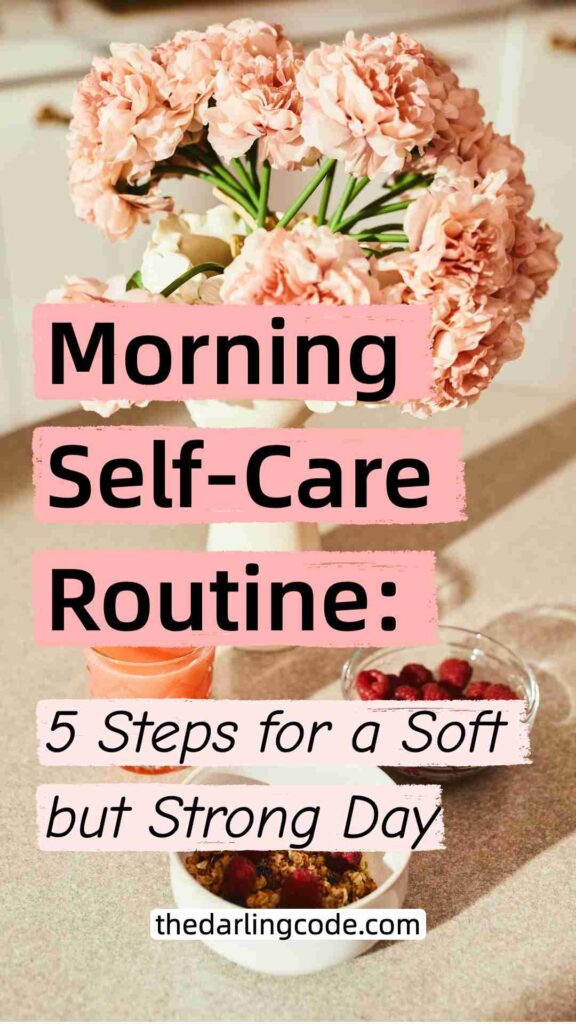Morning Self Care Routine: 5 Steps for a Soft but Strong Day
The experiences shared in this article are based on real emotional journeys, but all personal details are anonymized and used with the explicit written permission of the clients. Any resemblance to actual persons, living or dead, is purely coincidental. We are committed to treating all client stories with the utmost confidentiality and respect.
If you’re anything like me—or, honestly, the whole constellation of women I’ve coached over the past few years—you probably know that mornings can hold a fragile sort of magic. There’s a brief hush before the texts start rolling in, before work emails ramp up, before relationship worries slip through the cracks of your mind (yes, even experts have those). I’ve always believed that how you treat yourself in that quiet time shapes more than just your day; it shapes your inner narrative, your resilience, and the way you show up—in love, in work, and with yourself.
So today, I want to invite you into my world for a bit. As a relationship coach who spends most days walking alongside women through the messiness of dating, heartbreak, and rediscovering self-worth, I’ve noticed the power of small, intentional acts—especially those done in the early hours.
Below, you’ll find the five morning self care steps that I (and many of my clients) have woven into our lives, not to create a “picture-perfect” moment, but to build a foundation for something quietly steady and unshakeable.
This isn’t a list of rules or magic fixes—think of it as your gentle guide for days when your emotions are tender, your boundaries feel a little thin, or when you find yourself awake, staring at the ceiling, replaying a conversation that left you raw. And if you’re skeptically wondering if this is just another “drink water and stretch!” checklist—don’t worry. We’re going deeper.
Save this article for later—Pin it to Pinterest and come back when you need it! 📌

1. Wake Up With Kind Awareness (Not Warfare)
For a long time, my mornings felt like a dash into battle. The alarm would jolt me awake, my mind would immediately sprint to the most stressful item on my to-do list, and by the time I brushed my teeth, I was berating myself for not doing better (as if “better” was some destination I could reach by being tough on myself).
One Monday not so long ago, after spending the weekend spiraling about a text that never came, I tried something different: I woke up and simply noticed how I felt, with zero judgment. Just awareness. My first thought wasn’t “I shouldn’t be this upset,” but “Wow, I’m still thinking about that. No wonder I’m tired.”
This is where self-care really starts: with the acknowledgment of your emotional landscape, however messy or repetitive it might be. When I shared this approach with a client recently—let’s call her Leah—she confessed that her mornings began similarly, with an avalanche of anxious thoughts. When she gave herself permission to just notice (“I feel anxious. I don’t have to fix it right now. I can just see it.”), she realized much of her tension was in resisting her own feelings.
Here’s a gentle step for you: When you wake up, take two minutes—before reaching for your phone—to simply tune in. Ask yourself, “How am I, really?” You don’t have to rush to a solution or force gratitude. Sometimes, soft awareness is enough.
Little Check-In: How did you feel waking up today? If you feel like everything’s swirling, that’s okay. Even noticing is progress.
2. Create Physical Comfort—Your Way
Not all of us are “morning yoga” people; I know I’m not, at least not every day. Some mornings, comfort is less about movement and more about creating a cocoon. This could be the plushness of your favorite hoodie, the gentle warmth of sunlight through the blinds, or the feel of your hands wrapped around a mug.
A former client, Jasmine, who worked nights at a hospital, struggled with traditional “rise and shine!” routines that didn’t fit her schedule or state of exhaustion. For her, self care started with ten minutes in her coziest chair, blanket pulled up, sipping tea—not for health benefits, but for the simple comfort it brought. It was a time to feel physically safe and held, even if the day ahead was unpredictable.
For me, some mornings I rotate through rituals—a face mist that feels cool against sleepy skin, a “slow” playlist (think Hozier, Leon Bridges, or lo-fi beats), or sitting by an open window and listening to birds (surprisingly, even in a city, they show up).
If you share your space, this is a good moment to communicate your needs. “I’d love ten minutes just for myself” can feel awkward to say, especially if you’re not used to asking for space. But as someone who has supported people through breakups, roommate drama, and new love alike—asserting your needs in small ways sets the tone for honoring yourself on bigger issues.
Small Reflection: What’s one sensory comfort you can add to your morning? It can be delightfully tiny—a soft pair of socks, a favorite candle lit for just five minutes, music that feels like a hug.
3. Intentional Input: Choose What You Consume First
We are, whether we like it or not, creatures of input. One of the subtler burdens my clients carry is the endless scroll—news, social media, friend group drama delivered overnight via a handful of frantic texts. I am not about to tell you to avoid your phone entirely; it’s the 2020s, and for a lot of us, our support system, our family group chat, or our long-distance situationship is just a tap away.
Instead, think about what you choose to let in. A recent morning, I found myself sucked into a Twitter thread that left me tense before I’d even had coffee. Catching myself, I set my phone down and reached for a collection of short essays I keep on my nightstand—nothing long, just a few paragraphs that remind me not everything needs my immediate reaction.
For clients navigating heartbreak, I often say: if you know your ex’s stories or posts will leave you bruised, setting a boundary isn’t about being avoidant; it’s about being wise. You wouldn’t serve yourself a sour breakfast on purpose—why serve yourself sour news or memories before breakfast?
If reading or podcasts feel supportive, great—choose something that makes you feel more like yourself, not less. A favorite poem. An upbeat playlist. Even a few pages from a novel you loved as a teen. And if your heart is heavy with recent wounds, like ending things with someone you cared about, or wrestling with guilt over unfinished conversations, opt for input that’s gentle and affirming instead of triggering.
Pause and Consider: What’s the first thing you usually see or hear in the morning? Is it supporting you or draining you? What could you try switching out, just for tomorrow?
4. Mini-Mindfulness: Find Your Anchor
If you’re rolling your eyes thinking, “Great, more meditation advice from someone who probably owns an entire shelf of healing crystals”—I promise, that isn’t me. Mindfulness, at its core, is less about sitting cross-legged in silence and more about finding an anchor that brings you into full contact with now, no matter how stormy the internal weather is.
During the pandemic years when I was working from a small apartment, my “anchor” was, embarrassingly, my kitchen sink. Every morning, I’d stand there, hands in warm water, just breathing. It was mundane, yes, but incredibly centering. That task, done with deliberate attention, gave me five minutes where I was just a woman, not a coach, not a romantic partner, not anyone else’s solution.
For clients, this anchor takes many forms. One recently-divorced woman I work with uses drawing: she sketches a flower or a cup, not for beauty, but for the act itself. Another writes a single sentence in her journal about what she notices in her body or in the world outside her window (“The way my cat stretches when he wakes up,” for example).
If you’re navigating heartbreak, or you’re in that gray zone of wondering if you should stay or go, anchoring yourself in a sensory activity can give your mind and heart a tiny pause. This isn’t bypassing hard feelings—it’s marking a line between your core self and your current pain.
Try This: Choose one everyday task (making coffee, stretching, watering plants) and do it slowly, just noticing each step. Nothing fancy. Small, real, present.
Quick Check: Which ordinary part of your morning could you treat as your anchor tomorrow? How would it feel to make just that three minutes intentional?
5. Set a Gentle, Realistic Intention (Not a To-Do List)
We are, so many of us, great at lists. Grocery lists, goal lists, “things I should have said” lists that run laps in our brains at 2 a.m. What we’re less practiced at is setting a tone for the day that isn’t about achievement, but about how we want to move through our hours.
I learned this the hard way after a string of jobs left me so burnt out each morning felt like a slog. I got in the habit of planning days with five impossible tasks, then collapsing into bed feeling perpetually “behind.” One morning, on the advice of my own therapist (we all need a little help sometimes), I tried writing an intention instead: “Today, I will treat myself with softness, even when I stumble.”
A friend of mine—a client turned confidante—started setting her intention as a quiet phrase she’d pin in her notes app: “I will pause before I answer.” She was navigating a break with her partner, emotions ricocheting daily. The “pause” gave her room to breathe before reacting, especially when she felt tender or triggered.
Intentions aren’t about perfection or pretending everything’s great. If all you can manage is, “I’ll keep breathing today,” that’s worthy. It signals to your brain that you deserve kindness and space. And if your emotional state is somewhere between “barely hanging on” and “numb,” set the bar gentle.
Reflection Prompt: What’s a single word or phrase you might use as a gentle anchor today? No right answers. Maybe it’s “steadiness,” “openness,” or just “I’ll show up for myself.”
— Micro-Pause: Putting It All Together —
So let’s step back for a second.
It’s easy to look at these five steps and feel a little overwhelmed—or tempted to turn them into yet another checklist for self-optimization. But I want to invite you to resist that urge. The point isn’t to have an “Instagrammable morning” or even to tick off all five habits every day.
Rather, these steps are about weaving tiny moments of softness and strength into your morning, so that when you face the world (with its texts, its unanswered questions, its half-finished relationships), you do so grounded in your own worth.
You may find that on some mornings, all you can manage is one tiny practice. That’s not failure; that’s real life and real self-respect.
Which step are you most drawn to try tomorrow? Maybe just start with one—see how it feels.
Final Words from The Darling Code
If you’ve made it this far, you’ve gifted yourself not just time but the openness to try something new. As someone who has had the honor of holding space for hundreds of women and who still wakes up some mornings feeling uncertain, I want you to know this: Softness is not weakness. It is radical. It is the prerequisite for strength.
Whether you’re in the middle of a heartbreak you didn’t see coming, building yourself back up after disappointment, or just in need of new rhythms, your morning routine can be a thread you weave through it all—quiet proof that you’re worth care, even (and especially) before anyone else wakes up.
My gentle suggestion: pick one step tonight—write it on a sticky note, set a reminder in your phone, or even just think about it as you drift off to sleep. Tomorrow, try it. Let yourself notice, without judgment, how you feel.
And if it takes many mornings to find what fits, that’s okay, too. This isn’t about revolution; it’s about tiny recalibrations, done with heart. Your self-worth isn’t built in one sunrise.
You carry everything you need to start showing up softer, and stronger, right here, right now. That’s the real Darling Code.
With heart,
The Darling Code
PS: If this resonated, consider saving it on Pinterest or sharing with a friend who might need a little morning encouragement. Even better, tonight—set out one comfort item (a mug, a playlist, a quote) beside your bed to try one tiny shift tomorrow morning. You deserve it.
Got value from this article? Pin it to Pinterest for easy reference and help others discover it! 🌟


ABOUT THE AUTHOR
Vivienne, Relationship Coach & Self Love Coach
Vivienne is a Relationship Coach and Self-Love Coach who believes the key to great relationships starts with YOU. She helps individuals and couples build confidence, set healthy boundaries, and create connections that truly honor who they are.






